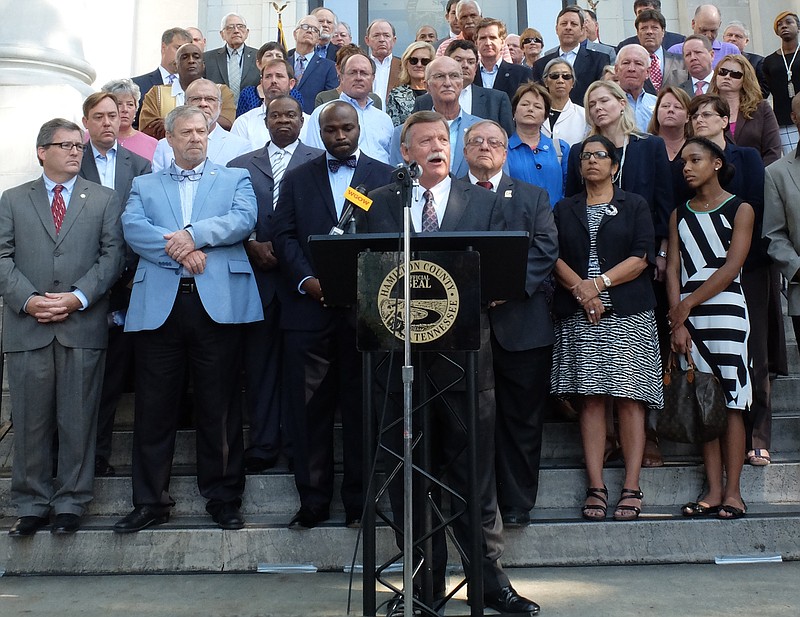The city of Chattanooga is preparing to follow the private sector's moves to get the employees it needs.
Mayor Tim Kelly said last Tuesday the budget he'll submit to the city council this week will raise pay for qualified recycling, trash and brush collection drivers by about $14,000, or 45%, to address a staff shortage.
In late July, the mayor suspended the city's curbside recycling pickup service because of the shortage. Last week, he explained he moved recycling drivers to garbage and brush pickup because their service either is mandated by law or done for safety purposes.
The city, according to Kelly, is short 32 drivers for its various services, and he hopes the new salaries, plus the city's generous benefits package, will fill the gap.
The mayor is doing what a number of successful United States companies have done over the past half decade to attract the workers they desire, who, in the humming pre-COVID economy, had their pick of jobs. Now, with vaccinations allowing the economy to resume much of its heat, jobs again are plentiful, and workers can be selective.
To wit:
* Facebook raised its minimum wage for contract workers in 2015 to $15 per hour, then to $20 an hour in 2019 in the San Francisco Bay Area, New York and Washington, D.C., and to $18 per hour in Seattle.
* Health care company Aetna began paying its U.S. hourly wage workers a minimum of $16 per hour in 2015.
* Target set a goal in 2017 to raise its minimum wage from $11 to $15 over the next three years and hit that mark in July 2020.
* Online retail giant Amazon raised its starting wage for all U.S. employees to at least $15 an hour in 2018.
* Charter Communications established a $15 minimum wage in 2018 and said it would raise its starting minimum wage to $20 an hour in 2022, with annual increases of $1.50 an hour in 2020 and 2021.
* Global health service company Cigna set a minimum wage for its U.S. employees at $16 an hour in 2018.
* Walt Disney World in 2018 reached an agreement with a group of unions to raise its minimum wage to $15 an hour by October 2021.
* Bank of America's minimum hourly wage was $17 in May 2019, and it moved to $20 an hour in March 2020.
* Costco upped its starting pay to $15 an hour in the U.S. in 2019 and to $16 an hour on Feb. 25 of this year.
* Google in 2019 began requiring that its U.S. vendor and temporary workers receive $15 an hour.
* Wells Fargo, in March 2020, said it would raise its minimum wage to at least $15 by the end of the year (and $20 for employees in high-cost areas).
* Best Buy pushed its minimum wage to $15 per hour in August 2020.
* Starbucks CEO Kevin Johnson said in a December 2020 letter to Congress the company plans to establish a minimum wage of $15 an hour over the next couple of years.
Although the federal minimum wage is $7.25 an hour and has been for 12 years, the size and financial health of the aforementioned companies have allowed them to more than double that wage.
If the new wages begin to disturb their bottom lines, they raise prices for their goods and services but do so at a rate they believe will not drive away Americans who can pay for those goods and services.
It's a little different for government. If it wants to increase wages, it either must cut other expenses in the budget to accommodate those pay hikes or raise taxes.
The city of Chattanooga, by all rights and compared to other cities, is in excellent financial shape coming out of the global pandemic. But it finds itself not only needing workers with commercial driver's licenses but also members of the police force, fire department and its Public Works department.
Kelly said his first budget will include a "complete overhaul" of the city pay structure and will offer significant pay increases for employees in each of those departments.
To pay for them, he said there would be some cuts from the previous budget, but he did not rule out a property tax increase.
This year Kelly has the option of doing what Hamilton County Mayor Jim Coppinger did in 2017, the last year before this one in which certified tax rates were changed. When properties were reappraised four years ago, Coppinger proposed to leave the county millage rate where it was, essentially raising taxes to pay for school construction, jail expansion at Silverdale Detention Center and a regional sewage treatment plant. The plan passed.
Now the Chattanooga mayor will have that option, leaving the rate at the old $2.28 level instead of the new rate of $1.85. That would be a de facto tax rise but would raise millions of dollars for those wage increases, which he said would make up for the fact the city is "way off the market in many, many job categories."
We don't know all the ins and outs of what Kelly is planning for the budget, but we do know paying market rates for workers is important in getting and keeping the best employees. Yet tax increases the first year in office don't make happy campers out of voters. On the other hand, voters may prefer to pay a little more to have their recyclables picked up, have enough police to respond to a crisis or have fire fighters get their cat out of a tree.
